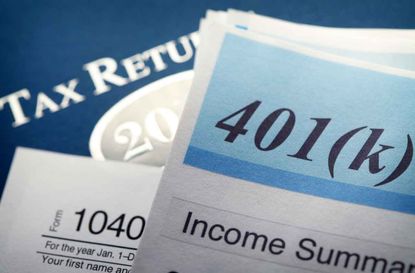Ex-Workers Get More Time to Repay 401(k) Loans
If you leave your job while you have an outstanding 401(k) loan, Uncle Sam now gives you extra time to repay it -- thanks to the new tax law.
- (opens in new tab)
- (opens in new tab)
- (opens in new tab)
- Newsletter sign up Newsletter


Question: I heard that the new tax law changed the amount of time I have after leaving my job to pay back a 401(k) loan. What are the rules now for borrowing from your 401(k)?
Answer: The new tax law changed the deadline for repayment after you leave your job starting in 2018. In the past, you generally had only 60 days to repay the loan or else you’d have to pay income taxes on the money as if it was a withdrawal (and a 10% early-withdrawal penalty if you left your job before age 55).
But under the Tax Cuts and Jobs Act, you don’t have to pay taxes or the penalty if you repay the loan by the due date of your tax return for the year when you leave your job (including extensions). For example, if you leave your job in 2019, you’d have until April 15, 2020, to repay the loan (or October 15, 2020, if you file an extension). However, taking advantage of this extended time frame to repay could lead to complications if you’d like to roll over your 401(k) balance to a new employer’s plan, says Michael Weddell, director of retirement at benefits consultant Willis Towers Watson (opens in new tab).

Sign up for Kiplinger’s Free E-Newsletters
Profit and prosper with the best of expert advice on investing, taxes, retirement, personal finance and more - straight to your e-mail.
Profit and prosper with the best of expert advice - straight to your e-mail.
You can generally borrow up to half of your 401(k) balance, but no more than $50,000. Most plans charge the prime rate plus 1 percentage point for the loan, which as of mid February would add up to 6.50%. You generally have five years to pay back the loan while you’re still working for that employer or longer if the 401(k) loan is to buy your primary residence. Most plans give employees 10 to 15 years to repay a loan for a primary residence, although some plans have deadlines as short as five years or as long as 30 years, says Weddell.
If you do take a 401(k) loan, try to keep contributing to your 401(k) while you’re paying back the loan so you can continue to receive any employer match and to minimize the hit to your long-term savings. You borrow your own money and pay the interest back into your account. But you will lose the opportunity for investment gains on the borrowed money while it’s out of the account. Just because you had to take a loan, Weddell says, is no reason to give up on saving for retirement and earning an employer match.

As the "Ask Kim" columnist for Kiplinger's Personal Finance, Lankford receives hundreds of personal finance questions from readers every month. She is the author of Rescue Your Financial Life (McGraw-Hill, 2003), The Insurance Maze: How You Can Save Money on Insurance -- and Still Get the Coverage You Need (Kaplan, 2006), Kiplinger's Ask Kim for Money Smart Solutions (Kaplan, 2007) and The Kiplinger/BBB Personal Finance Guide for Military Families. She is frequently featured as a financial expert on television and radio, including NBC's Today Show, CNN, CNBC and National Public Radio.
-
-
 Longevity: The Retirement Problem No One Is Discussing
Longevity: The Retirement Problem No One Is DiscussingMany people saving for retirement fail to take into account how living longer will affect how much they’ll need once they stop working. What should they do?
By Brian Skrobonja, Chartered Financial Consultant (ChFC®) • Published
-
 Capital Gains Taxes Trap: How to Avoid Mutual Fund Tax Bombs
Capital Gains Taxes Trap: How to Avoid Mutual Fund Tax BombsIt’s bad enough when your mutual fund’s assets lose value, but owing unexpected capital gains taxes after those losses is doubly frustrating.
By Samuel V. Gaeta, CFP® • Published
-
 5 Tax-Smart Charitable Giving Strategies for Retirees
5 Tax-Smart Charitable Giving Strategies for RetireesThere’s still time this year to do well by doing good, and there are still tax advantages to be had in charitable donations by retirees. Act soon, though!
By Steve Parrish, J.D., RICP® • Published
-
 How to Invest in Qualified Opportunity Zones: Step-By-Step
How to Invest in Qualified Opportunity Zones: Step-By-StepAn expert in QOZ programs walks us through how to benefit from some significant tax-deferral opportunities (and, if you hold your investment long enough, tax-free gains!).
By Daniel Goodwin • Published
-
 What Are Qualified Opportunity Zones? Important Details for Investors
What Are Qualified Opportunity Zones? Important Details for Investorsreal estate investing Investing in blighted or up-and-coming “opportunity zones” offers some significant tax-deferral opportunities, and if you hold your investment for 10 years, your gains could be 100% tax free.
By Daniel Goodwin • Published
-
 In What Order Should You Tap Your Retirement Funds?
In What Order Should You Tap Your Retirement Funds?retirement planning Should you go with your IRA first or your brokerage account? Pulling money haphazardly can have negative implications. Instead follow this road map for tax-smart withdrawals.
By John Carruthers, Certified Retirement Counselor® • Published
-
 Qualified Opportunity Zones vs. 1031 Exchanges
Qualified Opportunity Zones vs. 1031 Exchangesreal estate investing When it comes to real estate investing through qualified opportunity zones and 1031 exchanges, inquiring minds want to know which one is right for them.
By Daniel Goodwin • Published
-
 5 Unexpected Insights from Your Tax Return
5 Unexpected Insights from Your Tax Returntax planning Before you box up your tax return for your files, give it one last look for these five missed opportunities. It could save you money next year.
By Julia Vanzler, CFP® CPWA® • Published
-
 3 Tax-Efficient Strategies to Help Maximize Your Retirement Income
3 Tax-Efficient Strategies to Help Maximize Your Retirement Incometax planning Sometimes less income is a good thing! Here are three ways to help control your income in retirement and get a grip on the taxes you’ll pay.
By Neil Fenning • Published
-
 Do You Have a Retirement Plan, or Just a Bunch of Uncoordinated Accounts?
Do You Have a Retirement Plan, or Just a Bunch of Uncoordinated Accounts?retirement planning There’s a difference between having a portfolio of investments, savings and other assets and understanding why you have them and what purpose they are serving in your overall retirement plan.
By Zachary W. Herzog, Investment Adviser Representative • Published









